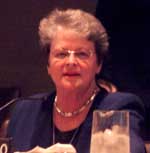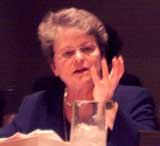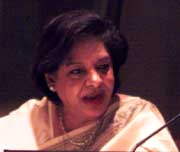|
CSW-43 |
|
BRIEFING for Wednesday, 3 March |
|
43rd CSW SESSION
- 5th AND 6th MEETINGS Delegates reassembled for the sixth meeting at 3:00 pm, where they heard the presentations of Gro Harlem Brundtland, Director-General, World Health Organization (WHO) and Nafis Sadik, Executive Director, United Nations Population Fund (UNFPA). Gro Harlem Brundtland underlined the linkages between the outcomes at Cairo, Beijing and the present tasks of the CSW (RealAudio of the presentation). She emphasized that if development is about ensuring an equitable distribution of resources, responsibilities and rewards that allow women and men to widen their choices, including those related to health, then the interaction of gender and poverty constitutes the greatest limiting factor to human development. She pointed out that to take on the challenges related to the health of women there was a need to acknowledge several "realities". The need of the hour was to focus beyond the sexual and reproductive health of women and view the different needs in their entire life-span. In this context she stated her commitment to incorporating a gender perspective across WHO's work and to move forward the women's health agenda. Nafis Sadik updated the gathering on the ongoing work on the International Commission on Population and Development (ICPD) review, which emphasized the importance of the right to health of women and girls, especially their reproductive health and rights (RealAudio of the presentation). Several of these issues were discussed at the Hague Forum where many countries shared best practices while noting that there were gaps that needed to be addressed. Important issues identified at the Hague Forum included pre-natal sex selection and poor nutritional status, maternal mortality, gender-based violence, female genital mutilation and HIV/AIDS. Sadik concluded by calling on governments to take the actions recommended during the ICPD+5 review. Following these presentations, the floor was open for comments and questions addressed to the speakers. Bangladesh, Mexico and Iraq were among those who had questions for the speakers on issues touched on in their presentations. On conclusion of the question and answer session the commission continued its dialogue on the topic of health. Delegates from different country-representatives and NGOs made their presentations. At 7:00 pm the commission resumed its general discussion of agenda items 3 (b) and 4. Sixteen delegates consisting of different country-representatives, international organizations and NGOs spoke on the issues of equality between men and women and initiation of the comprehensive review and appraisal of the implementation of the Platform for Action and preparation for the special session of the General Assembly in the year 2000. The commission will reconvene for its seventh meeting tomorrow at 11:00 am in conference room 1. THE OPEN-ENDED
AD HOC WORKING GROUP THINGS TO
LOOK FOR |
|
Today's photo and RealAudio highlights |
Address to Plenary by Gro Haarlem Bruntlund and Nafis Sadik

|

|
Return to ENB's CSW-43 home page
© Earth Negotiations Bulletin, 1999. All rights reserved.


